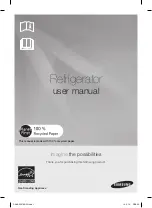
13
1. Do not open the refrigerator frequently or leave it open for a long time. This is to prevent water
dripping inside the refrigerator and will cause the waste of coolness and consumption of energy.
2. Do not refrigerate unnecessary items or hard-to-rot foodstuff such as pumpkin, shallot, garlic,
potato as it will make the refrigerator to work overload and waste the storage space without
necessity.
3. Adjust the temperature according to the actual operating condition for energy saving.
4. Do not refrigerate bottles bigger than the door shelf or the tray as the door will not close
completely causing coolness to leak.
5. Frequently check the door opening seal, it must be closed to the refrigerator’s body completely.
Do not leave the seal dirty or damaged or deteriorated as the coolness will leak and will cause
unnecessary consumption of energy.
6. If you will not be at home for several days or there are nothing refrigerated in the refrigerator, the
plug should be disconnected for energy saving, In this case, clean the refrigerator and leave it
half-open to prevent bad odor.
7. Clean the drain tray located over the compressor at the back of the refrigerator every three
months to prevent the odor generated from humidity.
8. Energy saving dryer pipes and heating pipes embedded around the refrigerator cabinet are
helping to prevent “condensation” on the outer surface of the cabinet without consuming energy.
This will make the outer wall of the refrigerator get warm and that is not a malfunction.
9. Drinking water bottles, beverage bottles such as soft drinks and fruit juices should be sealed
closely to prevent odor to get into the bottles.
REFRIGERATOR INSTRUCTION GUIDELINES
TROUBLESHOOTING
Before calling for servicing, please check the following.
The refrigerator does not operate.
* Check that the plug and its socket are in good condition.
* Check if there is any problem on main fuse and electrical system of the house.
The refrigerator does not cool properly.
* Check to be sure that the temperature control button is at the proper position.
* Check to see if the refrigerator is overloaded with stuff or there is any hot foodstuff refrigerated
inside.
* Is the refrigerator exposed directly to sunlight or heat source?
* Is the refrigerator door completely closed? Is the refrigerator opened frequently?
Vapor generated inside and outside the cabinet.
* Condensation may appear on the surface of cabinet when humidity is high, e.g. during rainy
season or the air circulation is not good.
* If there is condensation inside, check if the door is completely closed. Is the refrigerator
frequently opened or left open for a long time? Is there any hot foodstuff refrigerated inside?
The refrigerator generates noise.
* Check if the refrigerator is located on a stable floor or is installed properly.
* Check if there is any object in contact with the refrigerator.
NR-BY551-BY601-EN(B-1).indd 13
11/4/09 5:10:26 PM














































